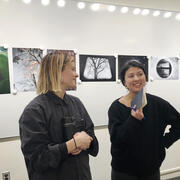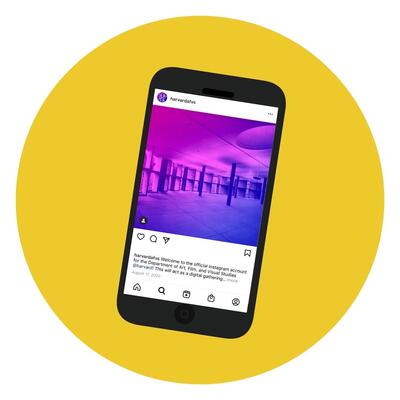This Spring 2021, the Department of Art, Film, and Visual Studies will offer courses in Studio Art and Film Making, including photography, animation, video art, painting, drawing, printmaking, sound, and sculpture, as well as film and visual studies, critical theory, and the study of the built environment.
For view our full list of courses, visit our Courses page, and see a few highlights below.
Most of the courses offered in AFVS are limited to 10 or 12 students because many are “making” courses, meaning students create artworks or films. The optimal way to conduct these courses is in small groups. Some seminars are also limited-enrollment.
During the remote spring term of 2021, Shopping will take place virtually starting January 15 so that students will still be able to check out a number of courses prior to the start of term on January 25. Clear instructions about class admissions processes during Shopping Week will be listed on each AFVS course Canvas site.
The AFVS Department’s Critical Pedagogy Working Group established the following set of Values for Admitting Students into Limited Enrollment Classes, which were adopted by the department in December 2020. Please read more about our commitment to these values here.
Below are a few course highlights from the upcoming semester! Keep in mind that 2-digit classes welcome absolute beginners, and that no experience is necessary. For more detail and links to each course’s Canvas site, us the Course Search tool on https://my.harvard.edu.
AFVS 14: Making Things
Katarina Burin
Currently we find ourselves physically isolated, living through screens, missing a sense of touch. This class will provide a space in which to reflect upon our changing relationship to the physical world - to evaluate our engagement with objects, how we live with them and what we seek from them. With a series of progressive hands-on assignments, we will learn how to think and make through a variety of materials and methods including paper, wood, casting and other non-traditional domestic materials. Each assignment will be a means through which to think about our personal processes of self-actualization through the adaptation, transformation and reiteration of materials and forms.
AFVS 126: Time Out of Mind: Exploring Paintings as Time Based Media
Tomashi Jackson
In this class, we will explore the practice of painting and notions of time through disciplinary lenses of video, music, and literature. We will define the characteristics of painting and time-based media for ourselves and through reflecting upon formal reference materials including texts, recordings and visits with special guests. Artist Sondra Perry will join monthly, guiding our discourse of video. Areas of critical focus include the stratas of painting and video: Image building, space, layering, figure/ground, color, form, and figuration. Class sessions will be designated for collective studio time/post production, individual studio visits, presentations, reading and listening, discussion, and group critique. Participants are expected to commit to active engagement and generosity of spirit to co-create the space and time we will share weekly.
AFVS 161L: Enter the Mediaverse: Studio Course
Lex Brown
Enter the Mediaverse will engage a wide swath of informative and entertaining digital media. Students will systematically map and decode the various visual and auditory structures of commercials, news, Youtube videos, reality TV, and more, and recombine those structures to deliver information in surprising, effective, optimistic, and useful ways. The goals of this class are for students to 1. Understand through practice and observation the various storytelling languages of telecommunication and how cultural, technical, & scientific information is disseminated across media, 2. To independently research topics of importance for public knowledge (in any field or application), and 3. To strategically broadcast this information using innovating audio-visual tactics across Internet and social media platforms. Writing projects will accompany each assignment to develop students' abilities to articulate their thoughts to and motivations behind their work.
AFVS 51A: Introduction to Video
Ross McElwee
A series of nonfiction projects, both individual and collaborative, designed to introduce and explore the range of expressive possibilities in digital video.
AFVS 252: Sonic Ethnography
Ernst Karel
This is a practice-based course in which students record, edit, and produce anthropologically informed audio works. Students will select a local 'site' where they can safely spend time throughout semester, and where the basic activity of research is stereo audio recording. Given our current spatial dispersion, this semester the focus will be on composing specifically for headphones. Over the course of the semester, listening sessions will provide a broad context of contemporary work using location recordings, and readings will situate the practice in relation to adjacent currents. In their projects, students will experiment with technical and conceptual strategies of recording and composition as they engage with questions of ethnographic representation through the medium of audio.
AFVS 70: The Art of Film: Currents in Contemporary World Cinema
Haden Guest
This course closely studies important currents at work in contemporary world cinema by exploring the work of key directors who expand long standing definitions of what cinema is and should be. Among the filmmakers central to the class are Lav Diaz, Lucrecia Martel, Pedro Costa, Kevin Jerome Everson, Apichatpong Weerasethakul, Claire Denis, Kelly Reichardt, Hong Sangsoo, Mati Diop, Alice Rohrwacher and Sky Hopinka. Select filmmakers will visit the class to present and discuss their work.
AFVS 231: Studio Language
Adrian Williams
Directed to specific themes in the practices of graduate students and undergraduate students in their junior and senior years, Studio Language considers the intersection of visual art and language (in its many forms). Drawing on intermedia and interdisciplinary work in the wider fields of art making and art theory, the course investigates the relationship between artwork and its conceptualization, contextualization, critique, exhibition, and dissemination.

